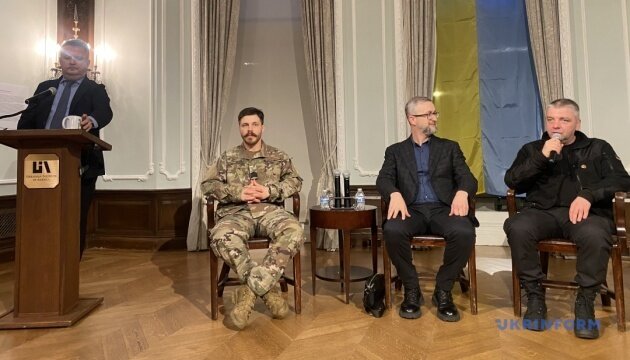Former Ukrainian POWs tell UN Security Council about torture in Russian captivity: Inhuman treatment, use of electroshock. PHOTO
At an informal meeting at the UN Security Council, former Ukrainian prisoners spoke about their stay and numerous tortures in Russian prisons, calling on the UN to make every effort to free the prisoners.
As noted, on Monday, the UN Security Council held an informal Arria-formula meeting to discuss Russia's violations of international humanitarian law against Ukrainian prisoners of war and detained civilians.
Valerii Horishnyi about Olenivka and torture in captivity
National Guard of Ukraine instructor Valeriy Horishnyi noted that he took part in the defence of Mariupol in 2022 and was taken prisoner.
Azov Brigade soldiers, he noted, are being brought before Russian "courts" and given harsh prison sentences, often up to life imprisonment, on charges that they were defending their homeland.
Horishnyi also spoke about the torture he and other prisoners were subjected to.
"This includes cruel, inhuman treatment, severe beatings, including fatal ones, the use of electroshock and other forms of torture," Horishnyi said.
Often prison guards "just enjoy torturing people", he added.
"There were long months when we received only ten spoons of porridge and about 150 grams of bread a day," he said.
Horishnyi also spoke about the bombing of the Olenivska prison on the night of July 28-29, which killed 53 prisoners.
"We urge you to make every effort to facilitate the exchange of prisoners of war," Horishnyi appealed to the UN states.
Nariman Dzhelal on the conditions of detention in a Russian prison
Crimean Tatar activist Nariman Dzhelial, sentenced to 17 years in prison by the so-called 'Supreme Court of Crimea', spent three years in prison 'because he publicly opposed the Russian occupation of Crimea'.
"I lived and worked in the occupied Crimea," he said. - "As a result of illegal and politically motivated persecution by the Russian occupation authorities, many activists and journalists, including me, were arrested.
Criminal cases were fabricated against them, torture and ill-treatment were used, Dzhelial said.
Political prisoners in the Russian Federation are deprived of the right to justice and cannot defend themselves, he added.
"I personally experienced many trials that are part of the life of political prisoners - poor food, lack of medical care, moral and physical humiliation, harassment...", - Dzhelial said. - "I and other prisoners were beaten, insulted and forced to learn and sing the Russian anthem, but I did not do it.
According to Dzhelal, Russia is known to be holding at least 218 Crimean political prisoners, 132 of whom are Crimean Tatars, which indicates a targeted persecution of the indigenous population.
"But this is just the tip of the iceberg," he said. - "Thousands of Ukrainian citizens in Crimea have become victims of political repression, thousands have left their homeland.
Maksym Butkevych on torture
Human rights activist and serviceman Maksym Butkevych, who was sentenced in Russia to 13 years in a maximum security colony, is a senior lieutenant of the 210th Separate Assault Regiment.
He joined the Ukrainian Armed Forces after the start of the full-scale invasion and was taken prisoner in June 2022, where he spent two years and four months.
Butkevych told how he was beaten by a Russian officer who demanded that he repeat Putin's quotes about the "history of Ukraine".
"We were humiliated, threatened, forced to shout 'Glory to Russia'.
Eventually, he was faced with a choice: "either I will sign a confession to war crimes, which will allow me to be exchanged after the verdict is announced, or I will refuse, and they will make my life a living hell or just shoot me."
According to him, Butkevych signed the papers without being able to read them. As a result, he was convicted of 'violating the Geneva Conventions'.
"Therefore, I urge you, first of all, to make all possible and necessary efforts to ensure the speedy release of Ukrainian prisoners of war and illegally detained civilians," Butkevych addressed the UN states. - "And in the meantime, create a proper independent international mechanism for monitoring places of detention.

